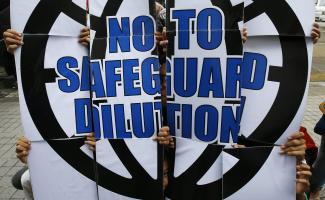Development finance
Raise the bar

Whereas the World Bank claims to contribute to the eradication of poverty, it continues to finance projects that jeopardise the vulnerable and the poor, emphasises Korinna Horta from Urgewald, an environmental civil-society organisation. Regarding the draft of the World Bank safeguard review, she identifies a worrying shift away from “mandatory safeguards”. Instead, she speaks of a trend to defining standards in unclear terms such as “if applicable” or “where feasible”. Horta sees “no improvement on the current situation”. In her eyes, the review must be over-hauled once more.
Members of 47 CSOs from several countries have expressed their frustration in a joint letter to the World Bank-president Jim Yong Kim. They are not satisfied with the review process and the way they were involved. They complained that participants in consultations were “hand picked” and not given sufficient information to prepare for meetings. Moreover, the review’s geographical reach was too limited.
In the past, there have often been problems with World Bank funded schemes. “After the investment of more than $ 7 billion, Chadians are even poorer than before” says Delphine Dijiraibe, a Chadian attorney. Since the inception of the World Bank funded Chad-Cameroon-Pipeline in 2003, she has been representing the rights of people who live next to the pipeline. She points out that Chad has dropped from rank 182 to rank 184 in the UN Development Programme’s Human Development Index. The lawyer argues that poverty in Chad is linked to an oil curse, with revenues benefiting only the ruling elite. Despite the World Bank’s promise to transform oil wealth into benefits of the poor, Chadians still live under authoritarian rule in deep poverty, Dijiraibe says.
Past experience
Chad is not the only example in which civil-society activists link grievances to mega-project funding from the World Bank and other IFIs. At a conference held by Urgewald in Berlin in March, cases from several different countries were discussed:
- According to Sergey Solyanik of the Kazakh CSO Crude Accountability, 80 % of the children in Berezovka, a village in Kazakhstan, suffer from chronic lung diseases caused by emissions from an oil-gas plant. His CSO supports villagers who demand to be resettled. So far, the management of the oil company denies any responsibility for the health problems.
- In Guatemala, indigenous peoples opposed the Santa Rita hydro-electric project. Their protests were harshly suppressed, reports Maximo Ba Tiul, a Guatemalan human-rights activist. Local leaders have falsely been accused of severe crimes.
- Jessica Evans of Human Rights Watch reports that more than 1 million people were evicted in the context of a governmental rural-development programme in the Gambella region of Ethiopia.
- She is similarly critical of a commercial cotton-production scheme in Uzbekistan. She says it was initially “sustained by child labour” and is now marked by “forced adult labour”.
All these cases involved World Bank funding. The activists point out that the World Bank’s safeguards did little to prevent the problems. They want matters to improve, but do not think that what the Bank has proposed so far will make a meaningful difference. Their demand is that the World Bank management has to raise its standards.
Urgewald’s Korinna Horta says that the World Bank’s new safeguards will set an example with great influence on other development-finance institutions, including other IFIs or national agencies such as Germany’s development bank KfW. She wants civil-society organisations and political leaders to pay attention accordingly. On the other hand, she believes that the results of the World Bank’s review process would have been stronger, had the Bank’s management not been afraid of losing business to other financial institutions, including those from emerging markets.
Theresa Krinninger
Link:
Safeguard review:
https://consultations.worldbank.org/consultation/review-and-update-world-bank-safeguard-policies







